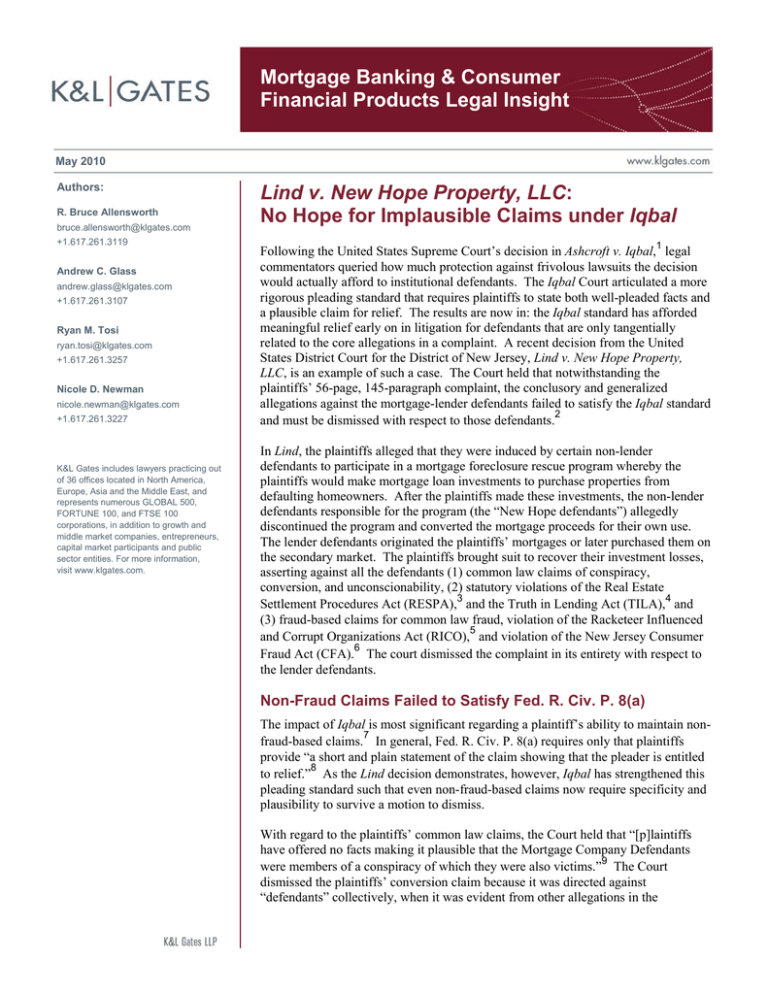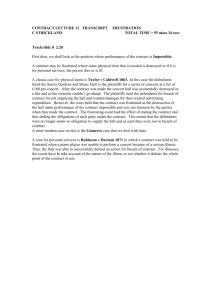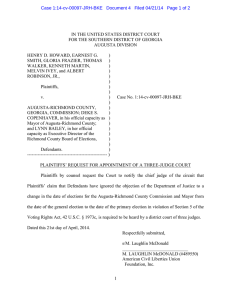
Mortgage Banking & Consumer
Financial Products Legal Insight
May 2010
Authors:
R. Bruce Allensworth
bruce.allensworth@klgates.com
+1.617.261.3119
Andrew C. Glass
andrew.glass@klgates.com
+1.617.261.3107
Ryan M. Tosi
ryan.tosi@klgates.com
+1.617.261.3257
Nicole D. Newman
nicole.newman@klgates.com
+1.617.261.3227
K&L Gates includes lawyers practicing out
of 36 offices located in North America,
Europe, Asia and the Middle East, and
represents numerous GLOBAL 500,
FORTUNE 100, and FTSE 100
corporations, in addition to growth and
middle market companies, entrepreneurs,
capital market participants and public
sector entities. For more information,
visit www.klgates.com.
Lind v. New Hope Property, LLC:
No Hope for Implausible Claims under Iqbal
1
Following the United States Supreme Court’s decision in Ashcroft v. Iqbal, legal
commentators queried how much protection against frivolous lawsuits the decision
would actually afford to institutional defendants. The Iqbal Court articulated a more
rigorous pleading standard that requires plaintiffs to state both well-pleaded facts and
a plausible claim for relief. The results are now in: the Iqbal standard has afforded
meaningful relief early on in litigation for defendants that are only tangentially
related to the core allegations in a complaint. A recent decision from the United
States District Court for the District of New Jersey, Lind v. New Hope Property,
LLC, is an example of such a case. The Court held that notwithstanding the
plaintiffs’ 56-page, 145-paragraph complaint, the conclusory and generalized
allegations against the mortgage-lender defendants failed to satisfy the Iqbal standard
2
and must be dismissed with respect to those defendants.
In Lind, the plaintiffs alleged that they were induced by certain non-lender
defendants to participate in a mortgage foreclosure rescue program whereby the
plaintiffs would make mortgage loan investments to purchase properties from
defaulting homeowners. After the plaintiffs made these investments, the non-lender
defendants responsible for the program (the “New Hope defendants”) allegedly
discontinued the program and converted the mortgage proceeds for their own use.
The lender defendants originated the plaintiffs’ mortgages or later purchased them on
the secondary market. The plaintiffs brought suit to recover their investment losses,
asserting against all the defendants (1) common law claims of conspiracy,
conversion, and unconscionability, (2) statutory violations of the Real Estate
3
4
Settlement Procedures Act (RESPA), and the Truth in Lending Act (TILA), and
(3) fraud-based claims for common law fraud, violation of the Racketeer Influenced
5
and Corrupt Organizations Act (RICO), and violation of the New Jersey Consumer
6
Fraud Act (CFA). The court dismissed the complaint in its entirety with respect to
the lender defendants.
Non-Fraud Claims Failed to Satisfy Fed. R. Civ. P. 8(a)
The impact of Iqbal is most significant regarding a plaintiff’s ability to maintain non7
fraud-based claims. In general, Fed. R. Civ. P. 8(a) requires only that plaintiffs
provide “a short and plain statement of the claim showing that the pleader is entitled
8
to relief.” As the Lind decision demonstrates, however, Iqbal has strengthened this
pleading standard such that even non-fraud-based claims now require specificity and
plausibility to survive a motion to dismiss.
With regard to the plaintiffs’ common law claims, the Court held that “[p]laintiffs
have offered no facts making it plausible that the Mortgage Company Defendants
9
were members of a conspiracy of which they were also victims.” The Court
dismissed the plaintiffs’ conversion claim because it was directed against
“defendants” collectively, when it was evident from other allegations in the
Mortgage Banking & Consumer Financial Products Legal Insight
complaint that the claim could only be intended to
10
target the New Hope defendants. Likewise, the
plaintiffs’ unconscionability claim could not stand
because it was based on “conclusory [and]
generalized allegations” and did “not state a
plausible ground of substantive unconscionability as
to the mortgage agreements held by the Mortgage
11
Company Defendants.”
Finally, the plaintiffs could not sustain their CFA
claim through the “bare accusation” that the
mortgage-lender defendants did not use “due
17
diligence” in issuing loans. Accordingly, the
Court dismissed each of the fraud-based claims
because of the lack of any specific allegations with
respect to the lender defendants.
Conclusion
In addition, the Court dismissed the plaintiffs’
RESPA and TILA claims because the alleged credit
transactions did not fall within the scope of either
statute. Specifically, the plaintiffs alleged that they
12
had entered the credit transactions as “investors.”
The Court held that loans obtained for a “business
13
purpose” are not covered by TILA or RESPA.
Fraud-Based Claims Failed to Satisfy
Fed. R. Civ. P. 9(b)
With regard to the claims of fraud, and violations of
RICO and CFA, the plaintiffs’ failure to make any
specific allegations against the mortgage-lender
defendants, and in particular, to identify what role, if
any, the lender defendants purportedly played in the
14
subject scheme, was fatal to those claims. In
holding that the plaintiffs had failed to meet the Fed.
R. Civ. P. 9(b) pleading standard, the Court found
that the complaint provided “no basis” on which to
15
lump the lenders together as “a single unit.” With
regard to the RICO claim, the plaintiffs failed to
allege the necessary “pattern of racketeering
activity” where the complaint made clear that the
16
subject scheme lasted under a year and had ended.
In strengthening the Fed. R. Civ. P. 8(a) pleading
standard, Iqbal and its progeny provide institutional
defendants with a fair shot at avoiding the costs
historically associated with defending against
unsupported and implausible allegations of
wrongdoing. An effective motion to dismiss
predicated on Iqbal creates an opportunity for
defendants to ward off expensive and burdensome
discovery. Ultimately, as demonstrated by the Lind
decision, the stringent Iqbal standard, requiring
detailed allegations to survive a motion to dismiss
for failure to state a claim, provides an enhanced
weapon to end frivolous lawsuits aimed at bystander
defendants.
***
R. Bruce Allensworth, Andrew C. Glass, Ryan M.
Tosi, and Nicole D. Newman of K&L Gates’ Boston
office, and Mark D. Marino and Justin A.
Greenblum of K&L Gates’ Newark office,
represented a mortgage-lender defendant in Lind v.
New Hope Property, LLC.
Anchorage Austin Beijing Berlin Boston Charlotte Chicago Dallas Dubai Fort Worth Frankfurt Harrisburg Hong Kong London
Los Angeles Miami Moscow Newark New York Orange County Palo Alto Paris Pittsburgh Portland Raleigh Research Triangle Park
San Diego San Francisco Seattle Shanghai Singapore Spokane/Coeur d’Alene Taipei Tokyo Warsaw
Washington, D.C.
K&L Gates includes lawyers practicing out of 36 offices located in North America, Europe, Asia and the Middle East, and represents numerous
GLOBAL 500, FORTUNE 100, and FTSE 100 corporations, in addition to growth and middle market companies, entrepreneurs, capital market
participants and public sector entities. For more information, visit www.klgates.com.
K&L Gates is comprised of multiple affiliated entities: a limited liability partnership with the full name K&L Gates LLP qualified in Delaware and
maintaining offices throughout the United States, in Berlin and Frankfurt, Germany, in Beijing (K&L Gates LLP Beijing Representative Office), in
Dubai, U.A.E., in Shanghai (K&L Gates LLP Shanghai Representative Office), in Tokyo, and in Singapore; a limited liability partnership (also named
K&L Gates LLP) incorporated in England and maintaining offices in London and Paris; a Taiwan general partnership (K&L Gates) maintaining an
office in Taipei; a Hong Kong general partnership (K&L Gates, Solicitors) maintaining an office in Hong Kong; a Polish limited partnership (K&L
Gates Jamka sp. k.) maintaining an office in Warsaw; and a Delaware limited liability company (K&L Gates Holdings, LLC) maintaining an office in
Moscow. K&L Gates maintains appropriate registrations in the jurisdictions in which its offices are located. A list of the partners or members in each
entity is available for inspection at any K&L Gates office.
This publication is for informational purposes and does not contain or convey legal advice. The information herein should not be used or relied upon
in regard to any particular facts or circumstances without first consulting a lawyer.
©2010 K&L Gates LLP. All Rights Reserved.
May 2010
2
Mortgage Banking & Consumer Financial Products Legal Insight
1
Ashcroft v. Iqbal, --- U.S. ----, 129 S. Ct. 1937,
1949 (2009).
2
Lind v. New Hope Property, LLC, No. 09-3757JBS-KMW, 2010 WL 1493003 (D.N.J. Apr. 13,
2010).
3
12 U.S.C. §§ 2601 et seq.
4
15 U.S.C. §§ 1601 et seq.
5
18 U.S.C. §§ 1961 et seq.
6
N.J. Stat. Ann. §§ 56:8-1 et seq.
7
Fed. R. Civ. P. 8(a).
8
Id.
9
Lind, 2010 WL 1493003, at *6.
10
Id. at *7.
11
Id.
12
Id. at *5.
13
Id. at *5, *6.
14
Id. at *4.
15
Id. at *5.
16
Id. at *5 n.9.
17
Id. at *5 n.8.
May 2010
3



